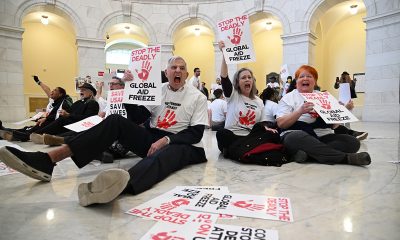Obituary
Beloved bartender Rudi Appl dies at 79
Worked at Mr. Henry’s restaurant and pub
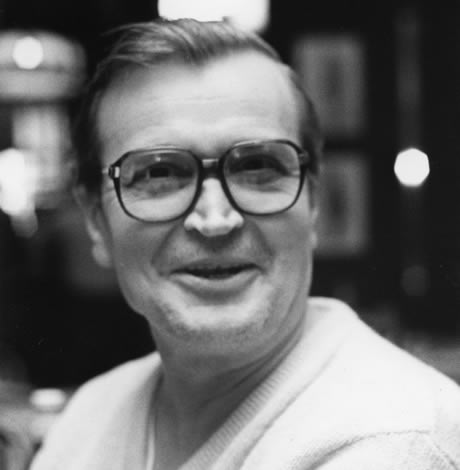
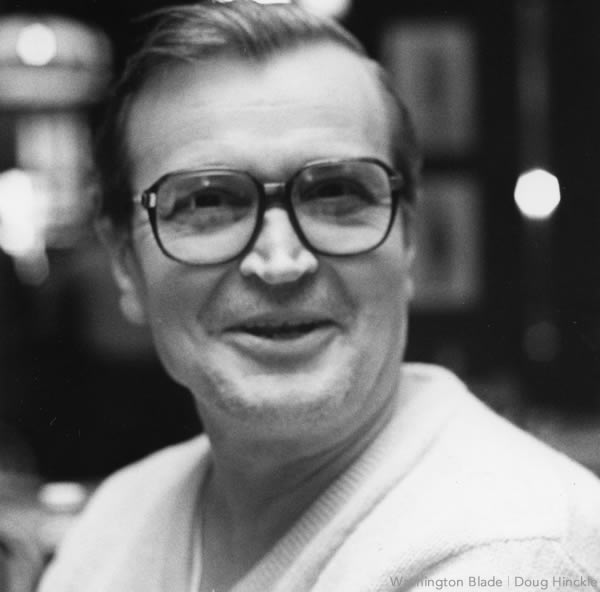
Rudy Appl (Washington Blade archive photo by Doug Hinckle)
Rudi Appl, a bartender at Mr. Henry’s restaurant and pub on Capitol Hill for nearly 50 years, died July 16 at his home from complications associated with heart disease. He was 79.
Longtime friends and co-workers at Mr. Henry’s say Appl’s bright and charming personality, his skills as a listener and conversationalist along with his distinctive accent as a native of Czech Republic appeared to immediately win over the affection of everyone that came in contact with him.
“I never heard him ever say a bad word about anybody,” said Walter Quetsch, a longtime Capitol Hill resident and Mr. Henry’s patron in whose basement apartment Appl lived for the past 33 years as a tenant.
“For him, everybody had a redeeming feature,” Quetsch said. “He mixed with everybody. He knew how to mix with people as well as he knew how to mix drinks.”
Chuck Sharman, a fellow bartender at Mr. Henry’s and a friend of Appl’s, said he has a copy of one of Appl’s immigration documents that shows he was born June 6, 1935 in Brno, the largest city in the region of Moravia in what was then Czechoslovakia and is now part of the Czech Republic.
“I well recall my first shift with Rudi at Mr. Henry’s, on a slow night upstairs,” Sharman told the Blade. “With hours to kill, he led me through a lengthy and colorful autobiography.”
Friends point to what they call Appl’s fascinating and colorful background prior to his move to Washington in 1966 that emerges from people like Sharman and others who knew Appl. More details of Appl’s background surfaced in a an interview and detailed profile of Appl written in May of this year by local businessman and writer Joe Englert for the Washington City Paper.
Englert reports that Appl told him that at the age of 9 his father arranged for him to escape World War II in Europe by sending him to Beirut, where he was enrolled in the American School. After the war the family reunited in Frankfurt, Germany, and settled there for a number of years, Appl said in his interview with Englert.
At about the age of 21 he and his parents moved to Canada and settled in the Canadian Rockies, where Appl worked for a while in the oil fields as a “roughneck.” He later began work in the hospitality industry at a resort near Alberta before going to Nassau in the Bahamas to work at the Paradise Island resort owned by famed businessman and A&P Supermarket heir Huntington Hartford, according to Englert’s profile.
Appl says in the interview that he became Hartford’s drinking buddy and assistant and had a chance to mingle with the rich and famous at the resort and during trips with Hartford to Hollywood. He first came to D.C. in 1963, became attracted to the U.S. capital, and traveled back and forth between Paradise Island and Washington until he decided to settle in D.C. for good in 1966, Englert reports in his profile.
Alvin Ross, the current owner of Mr. Henry’s, said he met Appl and became friends with him when the two first started working there as bartenders. The late Henry Yaffe, the founder and original owner of Mr. Henry’s, had just bought the establishment, which, at the time, had been operating as a country-western bar called the 601 Club, Ross told the Blade. Ross said Appl had been working at the 601Club “and came with the bar as part of the deal” when Yaffe bought the business.
Yaffe transformed the place into a Victorian pub, with furnishings and decorations of the Victorian period of the late 1800s, when many of Capitol Hill’s homes and buildings, including the nearby Eastern Market, sprung up in the surrounding neighborhood.
Appl, who was gay, got along well with the highly diverse crowds that have patronized Mr. Henry’s, both gay and straight, black and white, and families with children, according to longtime customers.
Ross noted that Appl at some point moved into the second-floor apartment above Mr. Henry’s as a tenant shortly after Yaffe became the owner. Ross and others who knew Appl have said he loved to tell the story of how he was “evicted” from the apartment as a result of famed singer and songwriter Roberta Flack, who got her career start at Mr. Henry’s.
As Appl told friends, he took a vacation in Europe to visit relatives after Flack began performing there in the late 1960s. During his absence Flack became such a sensation and an attraction that Yaffe converted the apartment into an extended space for Mr. Henry’s, where Flack performed to overflowing audiences.
Upon his return to Washington Appl discovered he no longer had an apartment, joking to friends that he was evicted because of Roberta Flack. However, he quickly found another apartment and continued to work at Mr. Henry’s as a bartender. A short time later, he moved into the English basement apartment at Quetsch’s townhouse on the 300 block of C Street, S.E., where he remained until the time of his death.
“Somehow or other we came to an agreement that he didn’t have to pay rent,” Quetsch said.
Englert reports in his City Paper profile that in the following years Appl, while working as a bartender, became a part-time real estate investor, buying and selling houses in the rapidly gentrifying Capitol Hill neighborhoods in the 1970s. The extra income enabled Appl to pursue his love for traveling throughout the U.S. and Europe as well as other places such as Thailand.
Ann Bradley, a longtime Capitol Hill resident and Mr. Henry’s patron who, like many others, became friends with Appl, said she enjoyed listening to his frequent stories about getting to know famous people, including Hollywood celebrities.
Bradley told the Blade she remained a bit skeptical, thinking that Appl may have embellished some of these stories. But around 1984, when Appl took her to a D.C. nightclub to see famed singer Peggy Lee perform, she witnessed first-hand his connection with at least one mega-star.
“After the show ended he said I’m going to go up and say hello to Peggy,” Bradley said. “And I thought, umhum, yeah right. He walked up and said something. And she didn’t say Hi Rudi,” Bradley recounted. “But she did say, ‘Oh, how are you!’ And they started talking and everything,” convincing Bradley that Peggy Lee genuinely appeared to recognize and show affection for Appl.
“The man was just unbelievable,” Bradley said. “He never had a bad day. He always had this positive attitude.”
Eric Monaghan, a longtime friend and next-door neighbor, said Appl became a mentor to him after the two first met in the early 1970s.
“Rudi was someone you meet and almost immediately want to keep on the first page of your telephone book,” Monaghan said. “You can’t file him alphabetically but as a major influence in your life.”
Terry Michael, executive director of the Washington Center for Politics and Journalism, has for years been among the wide range of Mr. Henry’s customers that have gotten to know Appl, including congressional staffers, politicians, journalists and ordinary working people.
“In my 40 years in these 68.3 miles surrounded by reality, I have seen much change,” Michael said. “But Rudi was a constant presence and force in a place that was a hangout for so many of us. With a constant smile on his face and a twinkle in his eyes, he exuded energy that was infectious.”
Ross said that because of his declining health, Appl had to cut back on the days he worked in recent years. In the last three or four months, Appl wasn’t able to work at all following the replacement of a heart pacemaker and additional complications associated with his heart ailment.
However, on his 79th birthday on July 6, Appl returned to Mr. Henry’s where employees and friends helped him celebrate.
“We had him come in and basically stay behind the bar and talk to people who came in to see him,” Ross said. “And he enjoyed that, but that was really his last day working.”
Sharman, who has access to some of Appl’s personal documents, said he is survived by two brothers who currently live in Germany and three nephews, two of whom live in Germany and one in Switzerland.
Ross said a memorial tribute for Appl is tentatively scheduled for Saturday, Sept. 6 in the upstairs room at Mr. Henry’s. He said further details of the memorial event will be announced on the Mr. Henry’s Facebook page.
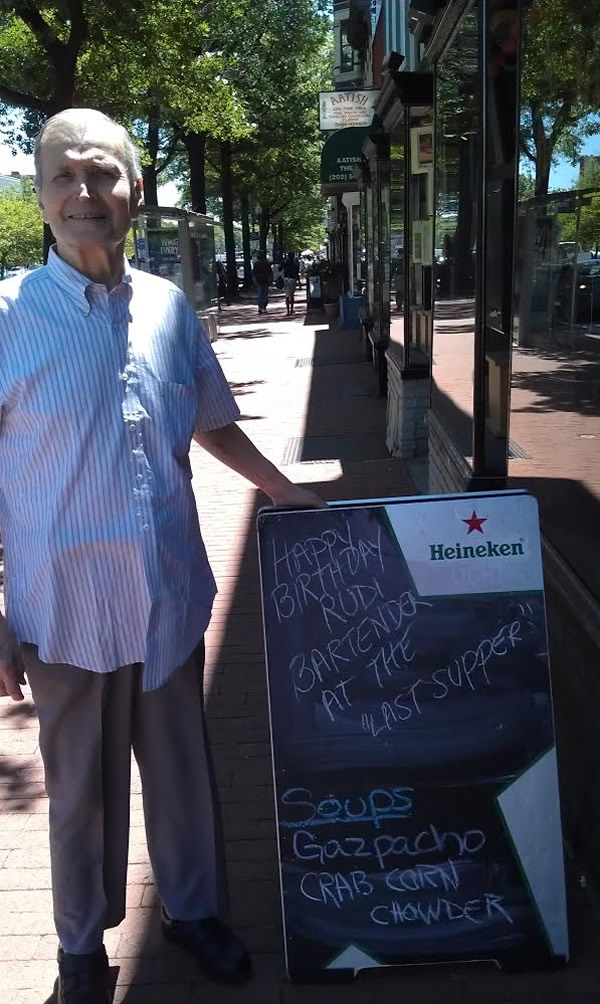
Rudi Appl stood outside Mr. Henry’s on his 79th birthday on July 6 next to a sign bearing an inscription by his friend and Mr. Henry’s owner Alvin Ross meant as a joke about Appl’s long tenure at the popular restaurant: ‘Happy Birthday Rudi — bartender at The Last Supper.’ (Photo courtesy of Caroline Shook)
Obituary
Local attorney, LGBTQ rights advocate Dale Sanders dies at 75
Acclaimed lawyer credited with advancing legal rights for people with HIV/AIDS
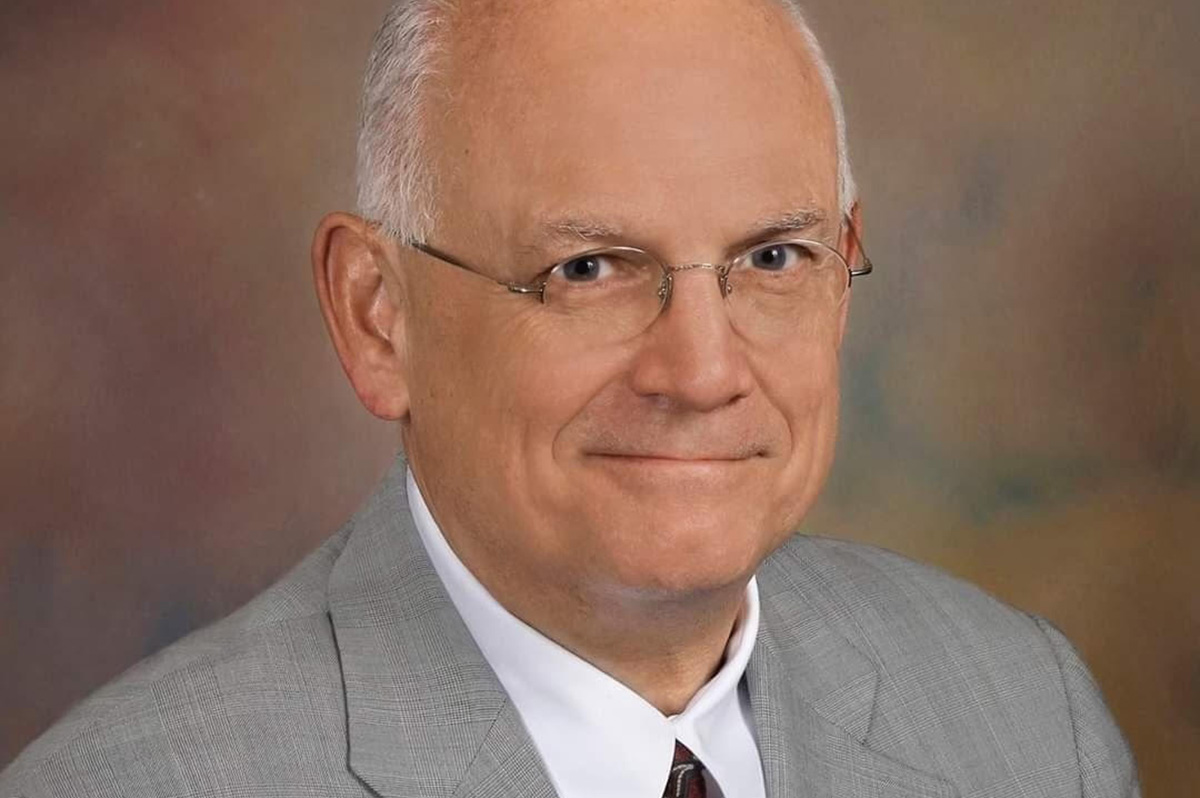
Dale Edwin Sanders, an attorney who practiced law in D.C. and Northern Virginia for more than 40 years and is credited with playing a key role in providing legal services for people living with HIV/AIDS beginning in the early 1980s, died April 10 at the age of 75.
His brother, Wade Sanders, said the cause of death was a heart attack that occurred at Johns Hopkins Hospital in Baltimore shortly after he had back surgery.
Wade Sanders described his brother as a “trial lawyer, passionate criminal defense, and civil litigator for human rights” for close to 50 years, with some of his work focused on “civil law, notably gay-related insurance discrimination during the AIDS epidemic.”
He called his brother “a zealous advocate for the oppressed, his clients, and his personal convictions.”
Born in Arlington, Va., and raised in McLean, Va., Dale Sanders graduated from Langley High School in McLean and received his bachelor’s degree from the University of Virginia, his brother said. He received his law degree from D.C.’s American University Washington College of Law and began his law practice in 1976 in Old Town, Alexandria, Wade Sanders said.
Amy Nelson, director of Legal Services for D.C. ‘s Whitman-Walker Health, said Sanders became one of Whitman-Walker’s original volunteer pro-bono attorneys in the 1980s.
“Dale was a beloved part of the legal services program and our medical-legal partnership for nearly 40 years,” Nelson said. “Dale was one of the clinic’s first volunteer attorneys at Whitman-Walker’s weekly, legal walk-in clinic offering free counseling to clients about their legal rights in the face of HIV/AIDS and LGBT discrimination from employers, landlords, medical providers, and insurance companies,” according to Nelson.
Nelson added, “Dale represented dozens of people impacted by the ignorance and prejudice attendant to an HIV/AIDS diagnosis, and his litigation wins were instrumental in advancing the legal rights of persons living with HIV/AIDS.”
Sanders’s most recent case on behalf of Whitman-Walker took place in 2023 in support of a transgender woman in Virginia who faced discrimination from her employer and health insurer, Nelson said.
In 1989, Whitman-Walker presented Sanders with its Gene Frey Award for Volunteer Service, and in 1994 presented him with its Founders Award for Pro Bono Legal Services, Nelson told the Blade. She said in 2024, Whitman-Walker re-named its annual Going the Extra Mile Pro Bono Award as the Dale Sanders Award for Pro Bono Excellence.
“Dale’s legacy helped to shape HIV/AIDS law, and his fierce commitment to justice will live on at Whitman-Walker Health,” Nelson said in a statement. “We will miss him dearly.”
Daniel Bruner, who served as Whitman-Walker’s legal services director prior to Amy Nelson taking that position, said Sanders played a role in shaping his own legal skills and knowledge.
“Dale was one of my earliest legal models among local, and national, advocates for people living with HIV and LGBT people,” Bruner told the Blade. “He was a fierce, persistent advocate for his clients and for the community,” Bruner said, adding, “He won key victories in several cases where employees’ or health care patients’ privacy had been egregiously violated. I certainly will never forget him.”
Wade Sanders said his brother was also an avid bridge player, saying he played competitively. “He earned the rank of Ruby Life Master, a pretty big deal in the bridge world,” Wade Sanders said.
Dale Sanders is survived by his husband, Christian Samonte; his sister, Joyce Sanders of York, S.C.; his brother Wade Sanders of West Jefferson, N.C.; and his beloved dogs Langley and Abigail, his brother said in a statement.
A memorial service for Dale Sanders organized by the Sanders family and the LGBTQ Catholic group Dignity Washington will be held Saturday, May 10, at 1 p.m. at St. Margaret’s Episcopal Church at 1830 Connecticut Ave., N.W. in D.C., a Dignity Washington spokesperson said.
Obituary
Nanette Kazaoka, an unlikely AIDS activist, dies at 83
Member of ACT-UP, longtime social justice advocate
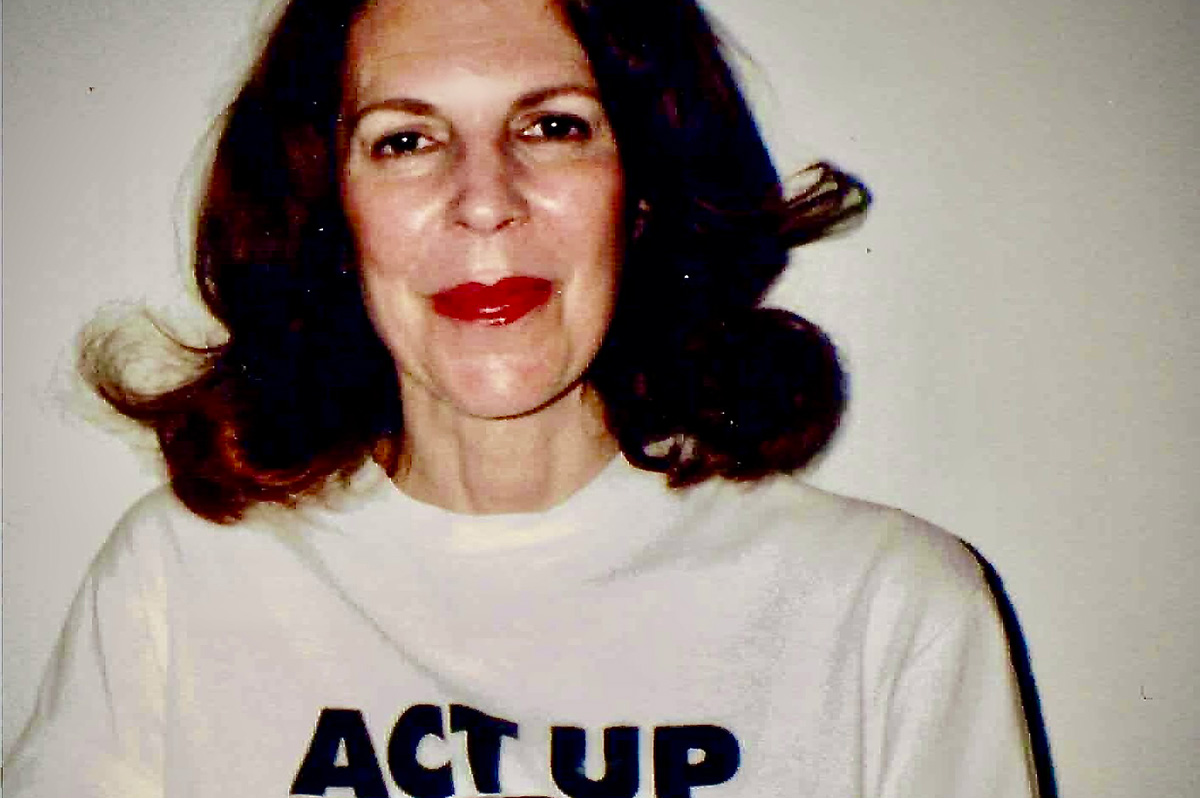
Nanette Kazaoka, a well-known figure in the fight for HIV/AIDS awareness and the rights of marginalized communities, passed away on Oct. 2 at her home in New York City. She was 83. The cause of death was complications from vascular dementia and Alzheimer’s disease, according to a statement from her daughter Kelly Kochendorfer.
Kazaoka was an advocate for justice, particularly in the early days of the AIDS crisis, when she became a member of the AIDS Coalition to Unleash Power, or ACT-Up. She is perhaps best remembered for her participation in a 2004 protest in front of Madison Square Garden during the Republican National Convention, when she and 11 fellow activists staged a dramatic naked demonstration, demanding debt cancellation for impoverished countries, according to a statement from the family.
“Bush, Stop AIDS. Drop the Debt Now!” they chanted, with slogans stenciled in black paint on their bodies. The bold protest drew national attention and underscored the urgency of global debt relief as a key element in the fight against AIDS.
She was born Nanette Natalina Bottinelli on June 12, 1941, in New York City. Her father, Angelo, worked as a waiter at the St. Regis Hotel, while her mother, Betty McComb, was a part-time burlesque dancer.
She married her first husband, Fred Kochendorfer, in 1963, and they had two children together, Kim Skrobe and Kelly, both of whom survive her.
Kazaoka’s journey to Fire Island marked a transformative period in her life. Kochendorfer wanted to live there, and so they began renting in 1967. Kazaoka then made a bold decision that would shape her future: She left her husband for another man and began living on Fire Island in 1968-1969, with the children attending school in Ocean Beach, according to the family’s statement.
This period coincided with the early days of the gay rights movement, as Fire Island was emerging as a hub for LGBTQ culture. Her experiences during these years contributed to the strong sense of activism and solidarity that would later define her role in ACT-UP and the broader fight for LGBTQ rights.
Kazaoka’s second husband, Katsushiga “Kats” Kazaoka, a Japanese-American psychologist who had been interred during World War II, died of cancer in 1984, pushing her to enter the workforce as a receptionist while studying occupational therapy at Downstate Medical Center. By 1990, she had earned her degree and sought work with AIDS patients.
In 1988, a close friend introduced her to ACT-UP, sparking the start of her full-time dedication to AIDS activism, the family said. Kazaoka became known for her passionate, unrelenting activism, whether protesting at City Hall or challenging anti-LGBTQ policies at St. Luke’s Hospital.
Kazaoka’s activism spanned 35 years, making her a beloved and respected figure within ACT-UP and beyond, the family noted. She was featured in Sarah Schulman’s “Let the Record Show: A Political History of ACT-Up New York, 1987-1993” as well as “Act-Up Oral History, No. 162,” a digital history. She was the cover photo of “Fag Hags, Divas and Moms: The Legacy of Straight Women in the AIDS Community,” and was included in The New York Times T Living Magazine story, “LEGENDS PIONEERS AND SURVIVORS.
Her dedication to science continued even after her passing: She donated her brain to the Mount Sinai NIH Brain and Tissue Repository for research to advance the understanding of the human brain health and disease to help end dementia, the family said.
Along with her daughters, Kazaoka is survived by her son-in-law John Skrobe, granddaughter Stella Skrobe and daughter-in-law Christine Arax, all of New York. She and her third husband, Paul Haskell, divorced in 2000.
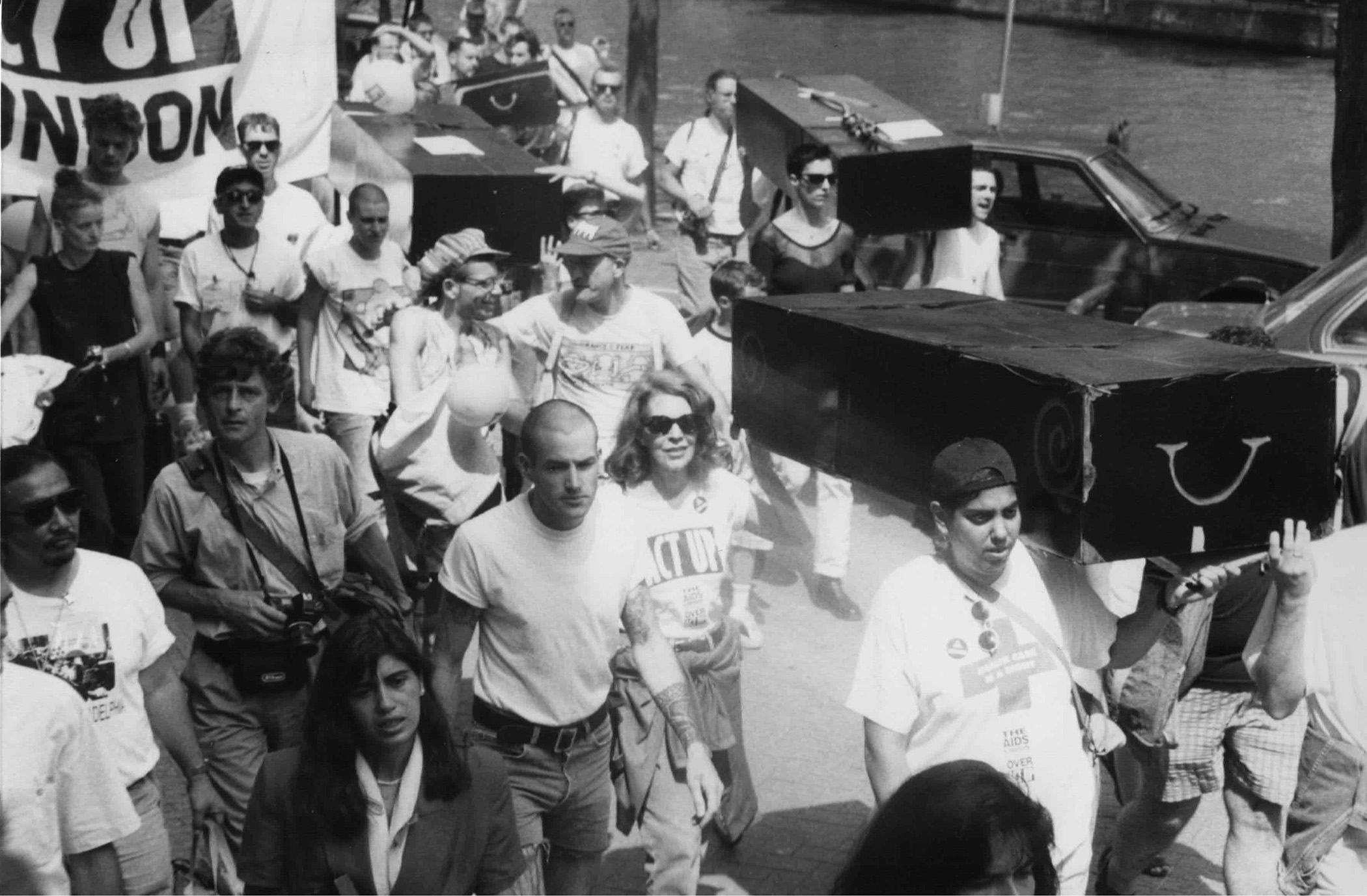
Local
D.C. LGBTQ rights advocate Jeri Hughes dies at 73
‘Force of nature’ credited with pro-trans policy at city jail
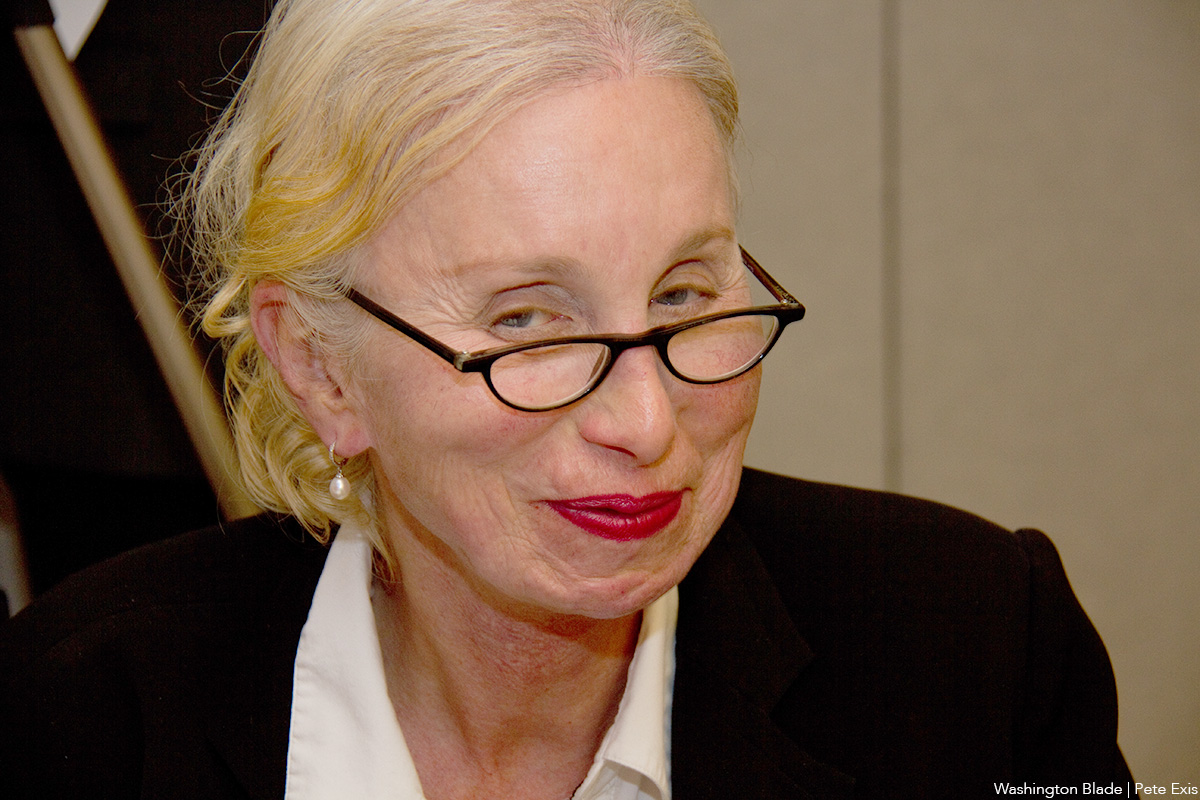
Jeri Hughes, a longtime D.C. transgender rights advocate who has worked closely with activists in support of the local LGBTQ community, died March 18 at her home after a seven-year battle with lung cancer. She was 73.
Hughes, who has worked for the past 11 years at the D.C. Department of Employment Services, most recently as a Workforce Development Specialist, became involved in local LGBTQ rights and transgender rights endeavors since she moved to D.C. around 2005.
Among other endeavors, Hughes, along with D.C. transgender rights advocate Earline Budd, has served for more than a decade on the D.C. Department of Corrections’ Transgender Housing and Transgender Advisory committees.
Budd this week said Hughes played an important role in ensuring that Department of Corrections officials continue to follow a 2009 policy of allowing transgender inmates to choose whether to be placed in the men’s or the women’s housing units at the D.C. jail.
“In her toughness and determination, Jeri was a force of nature,” said Rick Rosendall, former president of the D.C. Gay and Lesbian Activists Alliance. “She pressed the D.C. Department of Corrections for more humane and respectful treatment of transgender inmates,” Rosendall said.
“She pressed the D.C. government to set an example by hiring more trans people,” according to Rosendall, who added that Hughes interacted with D.C. police officials, including former D.C. Police Chief Peter Newsham, to push for respectful treatment of trans people by the police.
Hughes’s LinkedIn page shows that prior to working at the D.C. Department of Employment Services she served as housing coordinator for a local social services organization called T.H.E. Inc., where, among other things, she “monitored and mentored a diverse population of LGBT youth.”
Her LinkedIn page shows she also worked from June 2009 to May 2010 as an administrative assistant at the D.C. Anacostia Watershed Society.
Hughes’s brother, Lou Hughes, who said the Hughes family is originally from Ohio, told the Washington Blade Jeri Hughes served in the U.S. Navy after high school as a torpedo operator in a submarine in the South Pacific. He said a short time later Jeri Hughes moved to New York City, where she operated a company that provided commercial laundry service to restaurants and hospitals.
Lou Hughes said his sister Jeri moved to D.C. around 2005 and initially lived with him and his wife in a basement apartment in their house before moving to her own apartment in Northwest D.C. where she remained until her passing.
He said it was around 2005 that his sister informed her family that she planned to transition as a transgender woman at the age of 54. “And our family fully supported her decision, helped her finance the various surgeries,” Lou Hughes said. “And once she went through the transition it was like she was fully reborn.”
“And that’s why all these negative comments about transgender people right now – it’s very hurtful to our family because she was really the classic transgender person who was really simply born in the wrong body and gave our entire family a real sensitivity and understanding of what that meant,” Lou Hughes said.
Denise Leclair, one of Jeri Hughes’s closest friends and former roommate, said among Jeri Hughes’s many interests was boating. Leclair said Hughes persuaded her to join Hughes in purchasing a 45-foot sailboat in 2019, shortly after Hughes was diagnosed with lung cancer.
“We spent the next two months getting it fixed up and we started sailing,” Leclair recalls. “And we did quite a bit of sailing, so she really put her heart and soul into restoring this boat.”
Leclair said the boat was docked in a harbor in Deale, Md., just south of Annapolis. She said up until a few months ago, after her cancer prevented her from working full-time, Hughes spent most of her time living on the boat until her illness forced her to return to her D.C. apartment.
“My Dearest Sister Jeri, born April 30, 1951, left our restless Earth in the early morning of March 18, 2025, succumbing to the lung cancer which she battled against so bravely for seven years,” Lou Hughes says in a statement. “As we all know, Jeri was a person of high intellect, incredible energy and fearless in the face of adversity,” her brother wrote.
“Whether through acts of quiet charity, tireless advocacy, or simply offering a listening ear, Jeri made it a mission to uplift, support, and care for every person she encountered,” his statement says. “Her life was a testament to empathy in action, leaving a lasting legacy of love, hope, and selflessness that will continue to inspire all who knew her.”
In addition to her many friends and colleagues in D.C., Jeri Hughes is survived by her brother, Lou Hughes; sister-In-law Candice Hughes; daughter, Casey Martin; son-in-law Wally Martin; grandson Liam Martin; granddaughter, Mirella Martin; niece, Brittany Hughes; and nephew Klaus Meierdiercks.
A memorial service and celebration of life for Jeri Hughes is scheduled to be held May 10 at D.C.’s Metropolitan Community Church at 1 p.m., according to Earline Budd.
-

 State Department5 days ago
State Department5 days agoHIV/AIDS activists protest at State Department, demand full PEPFAR funding restoration
-

 Brazil5 days ago
Brazil5 days agoUS lists transgender Brazilian congresswoman’s gender as ‘male’ on visa
-

 District of Columbia5 days ago
District of Columbia5 days agoCapital Pride wins $900,000 D.C. grant to support WorldPride
-

 Obituary4 days ago
Obituary4 days agoLocal attorney, LGBTQ rights advocate Dale Sanders dies at 75



